PUBH20001: Social and Political Determinants of Health Report
VerifiedAdded on 2022/08/20
|6
|1506
|12
Report
AI Summary
This report, prepared for PUBH20001, examines the social and political determinants of health (SDOH) in Adelaide, Australia. It defines SDOH as the circumstances of birth, growth, work, living, and aging, shaped by social policies, economics, and politics. The report explores the social and conceptual models of health, including socioeconomic factors, health behaviors, and environmental influences. It identifies key SDOH such as income, education, gender, and social support, and discusses their impact on health inequalities. The analysis highlights disparities in health outcomes between different areas within Adelaide, such as the contrast between more advantaged areas and Playford, and emphasizes the role of government policies in addressing these inequalities. The report concludes by advocating for the removal of social barriers and the provision of equitable benefits to improve health outcomes for all residents.
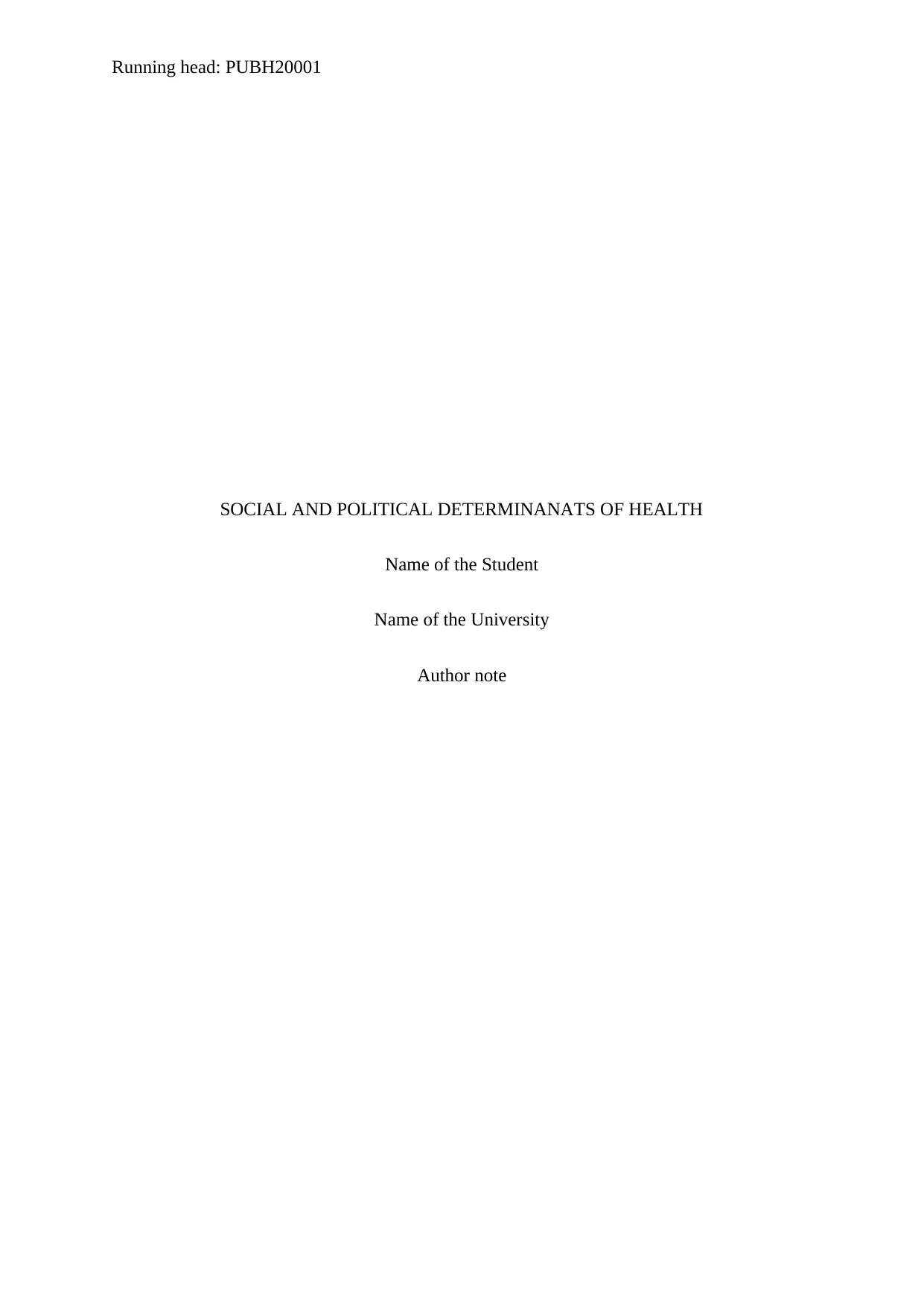
Running head: PUBH20001
SOCIAL AND POLITICAL DETERMINANATS OF HEALTH
Name of the Student
Name of the University
Author note
SOCIAL AND POLITICAL DETERMINANATS OF HEALTH
Name of the Student
Name of the University
Author note
Paraphrase This Document
Need a fresh take? Get an instant paraphrase of this document with our AI Paraphraser
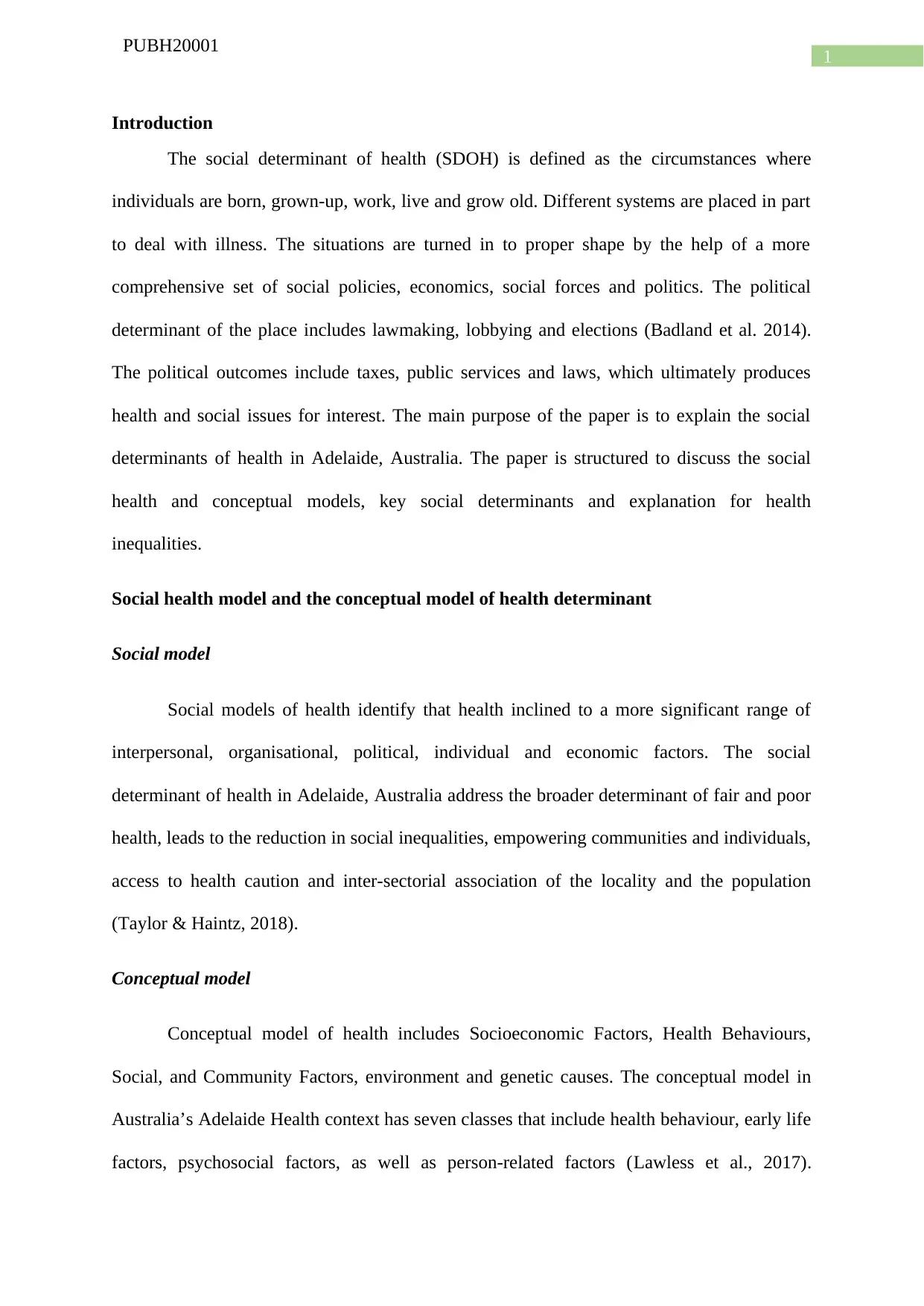
1
PUBH20001
Introduction
The social determinant of health (SDOH) is defined as the circumstances where
individuals are born, grown-up, work, live and grow old. Different systems are placed in part
to deal with illness. The situations are turned in to proper shape by the help of a more
comprehensive set of social policies, economics, social forces and politics. The political
determinant of the place includes lawmaking, lobbying and elections (Badland et al. 2014).
The political outcomes include taxes, public services and laws, which ultimately produces
health and social issues for interest. The main purpose of the paper is to explain the social
determinants of health in Adelaide, Australia. The paper is structured to discuss the social
health and conceptual models, key social determinants and explanation for health
inequalities.
Social health model and the conceptual model of health determinant
Social model
Social models of health identify that health inclined to a more significant range of
interpersonal, organisational, political, individual and economic factors. The social
determinant of health in Adelaide, Australia address the broader determinant of fair and poor
health, leads to the reduction in social inequalities, empowering communities and individuals,
access to health caution and inter-sectorial association of the locality and the population
(Taylor & Haintz, 2018).
Conceptual model
Conceptual model of health includes Socioeconomic Factors, Health Behaviours,
Social, and Community Factors, environment and genetic causes. The conceptual model in
Australia’s Adelaide Health context has seven classes that include health behaviour, early life
factors, psychosocial factors, as well as person-related factors (Lawless et al., 2017).
PUBH20001
Introduction
The social determinant of health (SDOH) is defined as the circumstances where
individuals are born, grown-up, work, live and grow old. Different systems are placed in part
to deal with illness. The situations are turned in to proper shape by the help of a more
comprehensive set of social policies, economics, social forces and politics. The political
determinant of the place includes lawmaking, lobbying and elections (Badland et al. 2014).
The political outcomes include taxes, public services and laws, which ultimately produces
health and social issues for interest. The main purpose of the paper is to explain the social
determinants of health in Adelaide, Australia. The paper is structured to discuss the social
health and conceptual models, key social determinants and explanation for health
inequalities.
Social health model and the conceptual model of health determinant
Social model
Social models of health identify that health inclined to a more significant range of
interpersonal, organisational, political, individual and economic factors. The social
determinant of health in Adelaide, Australia address the broader determinant of fair and poor
health, leads to the reduction in social inequalities, empowering communities and individuals,
access to health caution and inter-sectorial association of the locality and the population
(Taylor & Haintz, 2018).
Conceptual model
Conceptual model of health includes Socioeconomic Factors, Health Behaviours,
Social, and Community Factors, environment and genetic causes. The conceptual model in
Australia’s Adelaide Health context has seven classes that include health behaviour, early life
factors, psychosocial factors, as well as person-related factors (Lawless et al., 2017).
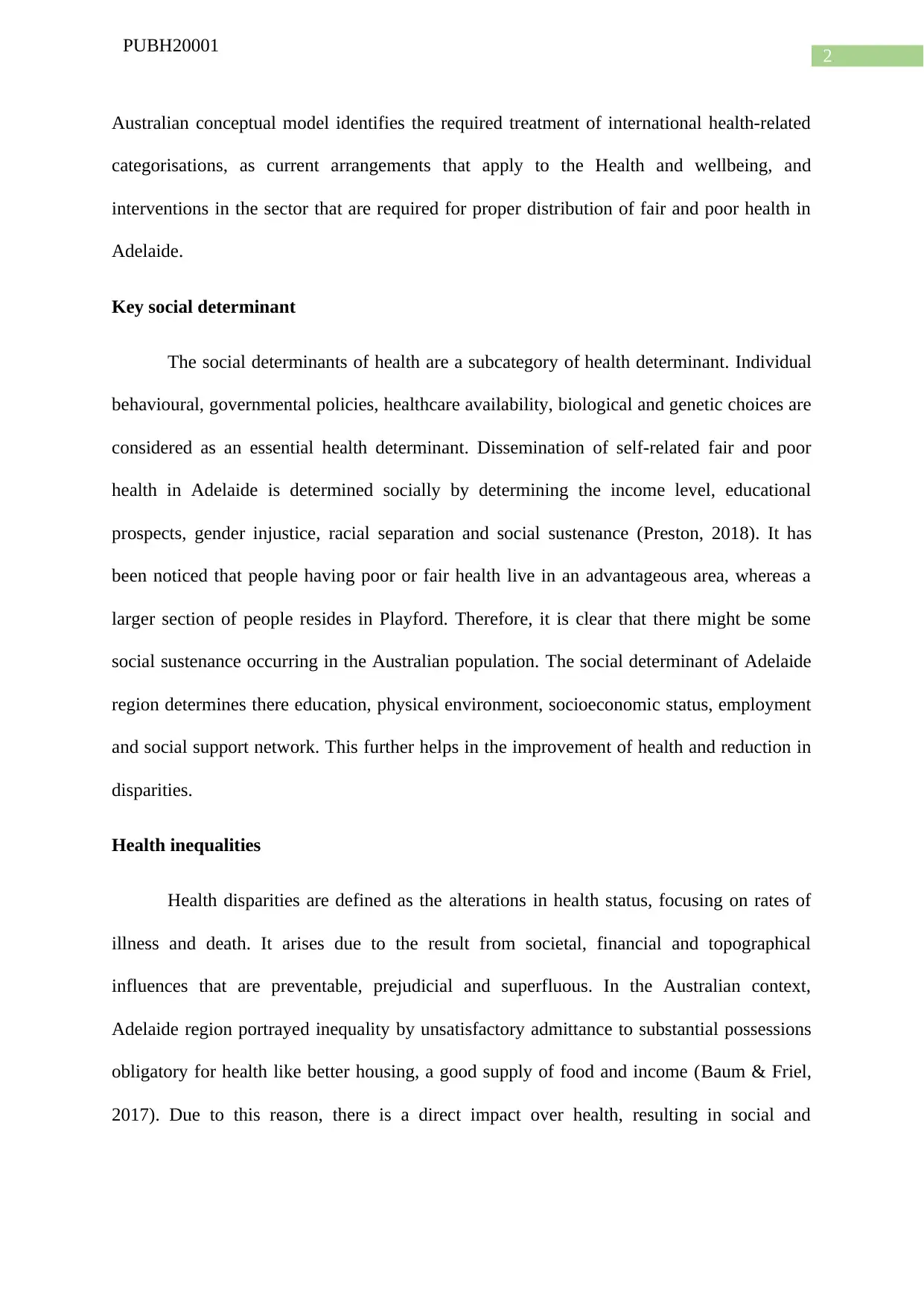
2
PUBH20001
Australian conceptual model identifies the required treatment of international health-related
categorisations, as current arrangements that apply to the Health and wellbeing, and
interventions in the sector that are required for proper distribution of fair and poor health in
Adelaide.
Key social determinant
The social determinants of health are a subcategory of health determinant. Individual
behavioural, governmental policies, healthcare availability, biological and genetic choices are
considered as an essential health determinant. Dissemination of self-related fair and poor
health in Adelaide is determined socially by determining the income level, educational
prospects, gender injustice, racial separation and social sustenance (Preston, 2018). It has
been noticed that people having poor or fair health live in an advantageous area, whereas a
larger section of people resides in Playford. Therefore, it is clear that there might be some
social sustenance occurring in the Australian population. The social determinant of Adelaide
region determines there education, physical environment, socioeconomic status, employment
and social support network. This further helps in the improvement of health and reduction in
disparities.
Health inequalities
Health disparities are defined as the alterations in health status, focusing on rates of
illness and death. It arises due to the result from societal, financial and topographical
influences that are preventable, prejudicial and superfluous. In the Australian context,
Adelaide region portrayed inequality by unsatisfactory admittance to substantial possessions
obligatory for health like better housing, a good supply of food and income (Baum & Friel,
2017). Due to this reason, there is a direct impact over health, resulting in social and
PUBH20001
Australian conceptual model identifies the required treatment of international health-related
categorisations, as current arrangements that apply to the Health and wellbeing, and
interventions in the sector that are required for proper distribution of fair and poor health in
Adelaide.
Key social determinant
The social determinants of health are a subcategory of health determinant. Individual
behavioural, governmental policies, healthcare availability, biological and genetic choices are
considered as an essential health determinant. Dissemination of self-related fair and poor
health in Adelaide is determined socially by determining the income level, educational
prospects, gender injustice, racial separation and social sustenance (Preston, 2018). It has
been noticed that people having poor or fair health live in an advantageous area, whereas a
larger section of people resides in Playford. Therefore, it is clear that there might be some
social sustenance occurring in the Australian population. The social determinant of Adelaide
region determines there education, physical environment, socioeconomic status, employment
and social support network. This further helps in the improvement of health and reduction in
disparities.
Health inequalities
Health disparities are defined as the alterations in health status, focusing on rates of
illness and death. It arises due to the result from societal, financial and topographical
influences that are preventable, prejudicial and superfluous. In the Australian context,
Adelaide region portrayed inequality by unsatisfactory admittance to substantial possessions
obligatory for health like better housing, a good supply of food and income (Baum & Friel,
2017). Due to this reason, there is a direct impact over health, resulting in social and
⊘ This is a preview!⊘
Do you want full access?
Subscribe today to unlock all pages.

Trusted by 1+ million students worldwide
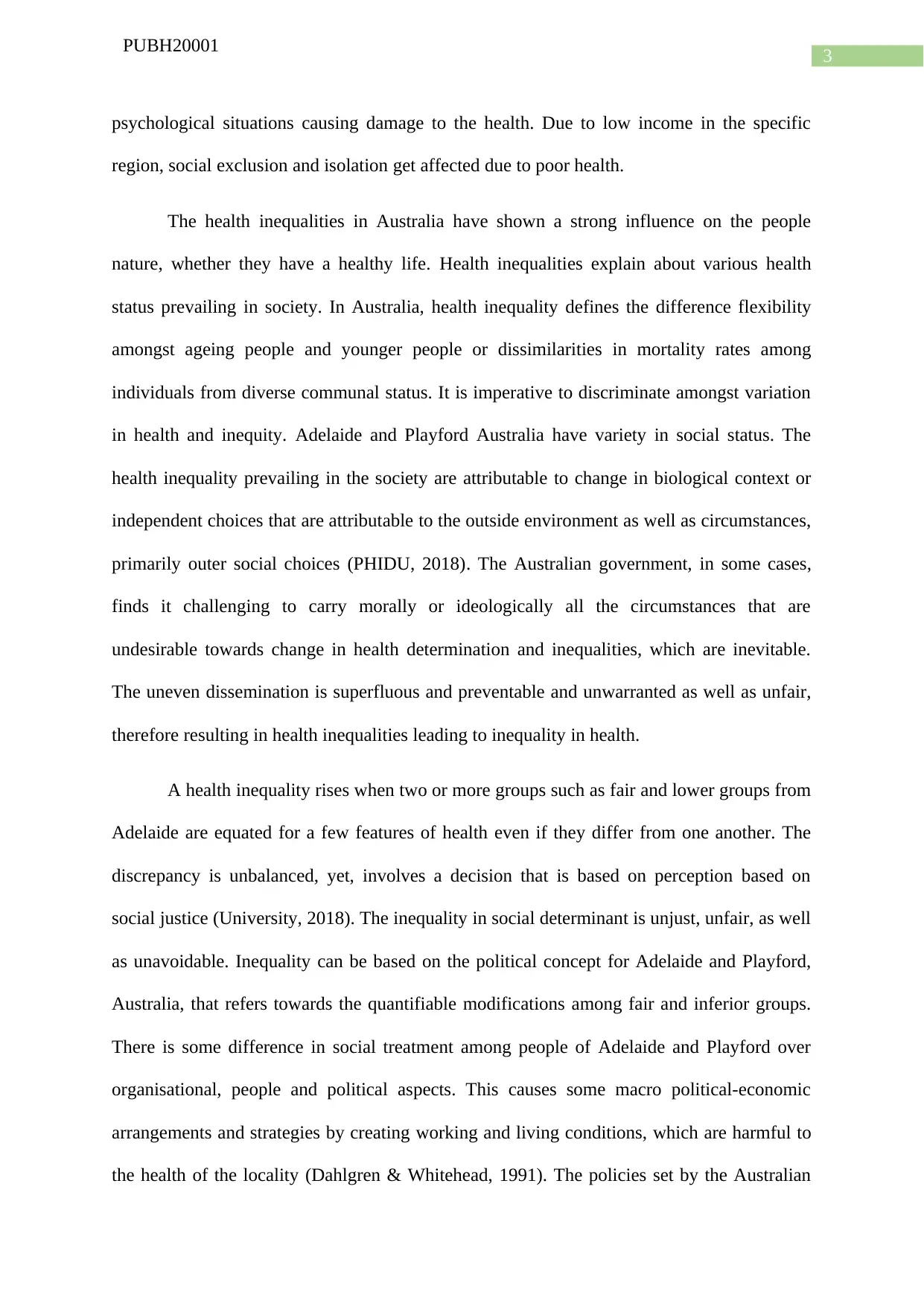
3
PUBH20001
psychological situations causing damage to the health. Due to low income in the specific
region, social exclusion and isolation get affected due to poor health.
The health inequalities in Australia have shown a strong influence on the people
nature, whether they have a healthy life. Health inequalities explain about various health
status prevailing in society. In Australia, health inequality defines the difference flexibility
amongst ageing people and younger people or dissimilarities in mortality rates among
individuals from diverse communal status. It is imperative to discriminate amongst variation
in health and inequity. Adelaide and Playford Australia have variety in social status. The
health inequality prevailing in the society are attributable to change in biological context or
independent choices that are attributable to the outside environment as well as circumstances,
primarily outer social choices (PHIDU, 2018). The Australian government, in some cases,
finds it challenging to carry morally or ideologically all the circumstances that are
undesirable towards change in health determination and inequalities, which are inevitable.
The uneven dissemination is superfluous and preventable and unwarranted as well as unfair,
therefore resulting in health inequalities leading to inequality in health.
A health inequality rises when two or more groups such as fair and lower groups from
Adelaide are equated for a few features of health even if they differ from one another. The
discrepancy is unbalanced, yet, involves a decision that is based on perception based on
social justice (University, 2018). The inequality in social determinant is unjust, unfair, as well
as unavoidable. Inequality can be based on the political concept for Adelaide and Playford,
Australia, that refers towards the quantifiable modifications among fair and inferior groups.
There is some difference in social treatment among people of Adelaide and Playford over
organisational, people and political aspects. This causes some macro political-economic
arrangements and strategies by creating working and living conditions, which are harmful to
the health of the locality (Dahlgren & Whitehead, 1991). The policies set by the Australian
PUBH20001
psychological situations causing damage to the health. Due to low income in the specific
region, social exclusion and isolation get affected due to poor health.
The health inequalities in Australia have shown a strong influence on the people
nature, whether they have a healthy life. Health inequalities explain about various health
status prevailing in society. In Australia, health inequality defines the difference flexibility
amongst ageing people and younger people or dissimilarities in mortality rates among
individuals from diverse communal status. It is imperative to discriminate amongst variation
in health and inequity. Adelaide and Playford Australia have variety in social status. The
health inequality prevailing in the society are attributable to change in biological context or
independent choices that are attributable to the outside environment as well as circumstances,
primarily outer social choices (PHIDU, 2018). The Australian government, in some cases,
finds it challenging to carry morally or ideologically all the circumstances that are
undesirable towards change in health determination and inequalities, which are inevitable.
The uneven dissemination is superfluous and preventable and unwarranted as well as unfair,
therefore resulting in health inequalities leading to inequality in health.
A health inequality rises when two or more groups such as fair and lower groups from
Adelaide are equated for a few features of health even if they differ from one another. The
discrepancy is unbalanced, yet, involves a decision that is based on perception based on
social justice (University, 2018). The inequality in social determinant is unjust, unfair, as well
as unavoidable. Inequality can be based on the political concept for Adelaide and Playford,
Australia, that refers towards the quantifiable modifications among fair and inferior groups.
There is some difference in social treatment among people of Adelaide and Playford over
organisational, people and political aspects. This causes some macro political-economic
arrangements and strategies by creating working and living conditions, which are harmful to
the health of the locality (Dahlgren & Whitehead, 1991). The policies set by the Australian
Paraphrase This Document
Need a fresh take? Get an instant paraphrase of this document with our AI Paraphraser

4
PUBH20001
government regarding social determinant of health helps in preventing the distribution of
crucial health as well as other public facilities inequitably and unethically. It thereby prevents
some people and groups from contributing entirely in the social, societal or communal life of
society. Excess mortality and morbidity that are self-portrayed in Adelaide and Playford
region of Australia, where few of them are related to chronic diseases are associated with
socioeconomic shortcoming and with methodical social elimination and persistent among the
health system. Hence, it is necessary to rule out the health inequality prevailing in Australia
by improving the economic status of every individual. This would help the individual to fell
equality and hence remove the effect of disparities.
Conclusion
Hence, it can be concluded from the paper that health inequalities arise due to several
reasons. Circumstances that cause health inequalities are unfavourable to all people residing
in the community. Some specific health inequalities have some side effects over the society,
thereby affecting the socio-economic condition of the locality. It has also been noticed that
due to social disparities, people with lesser economy gets addicted towards crimes and other
social issues. Hence it is highly recommended to remove social barriers by providing
advantageous benefits to fair and poor lives.
PUBH20001
government regarding social determinant of health helps in preventing the distribution of
crucial health as well as other public facilities inequitably and unethically. It thereby prevents
some people and groups from contributing entirely in the social, societal or communal life of
society. Excess mortality and morbidity that are self-portrayed in Adelaide and Playford
region of Australia, where few of them are related to chronic diseases are associated with
socioeconomic shortcoming and with methodical social elimination and persistent among the
health system. Hence, it is necessary to rule out the health inequality prevailing in Australia
by improving the economic status of every individual. This would help the individual to fell
equality and hence remove the effect of disparities.
Conclusion
Hence, it can be concluded from the paper that health inequalities arise due to several
reasons. Circumstances that cause health inequalities are unfavourable to all people residing
in the community. Some specific health inequalities have some side effects over the society,
thereby affecting the socio-economic condition of the locality. It has also been noticed that
due to social disparities, people with lesser economy gets addicted towards crimes and other
social issues. Hence it is highly recommended to remove social barriers by providing
advantageous benefits to fair and poor lives.
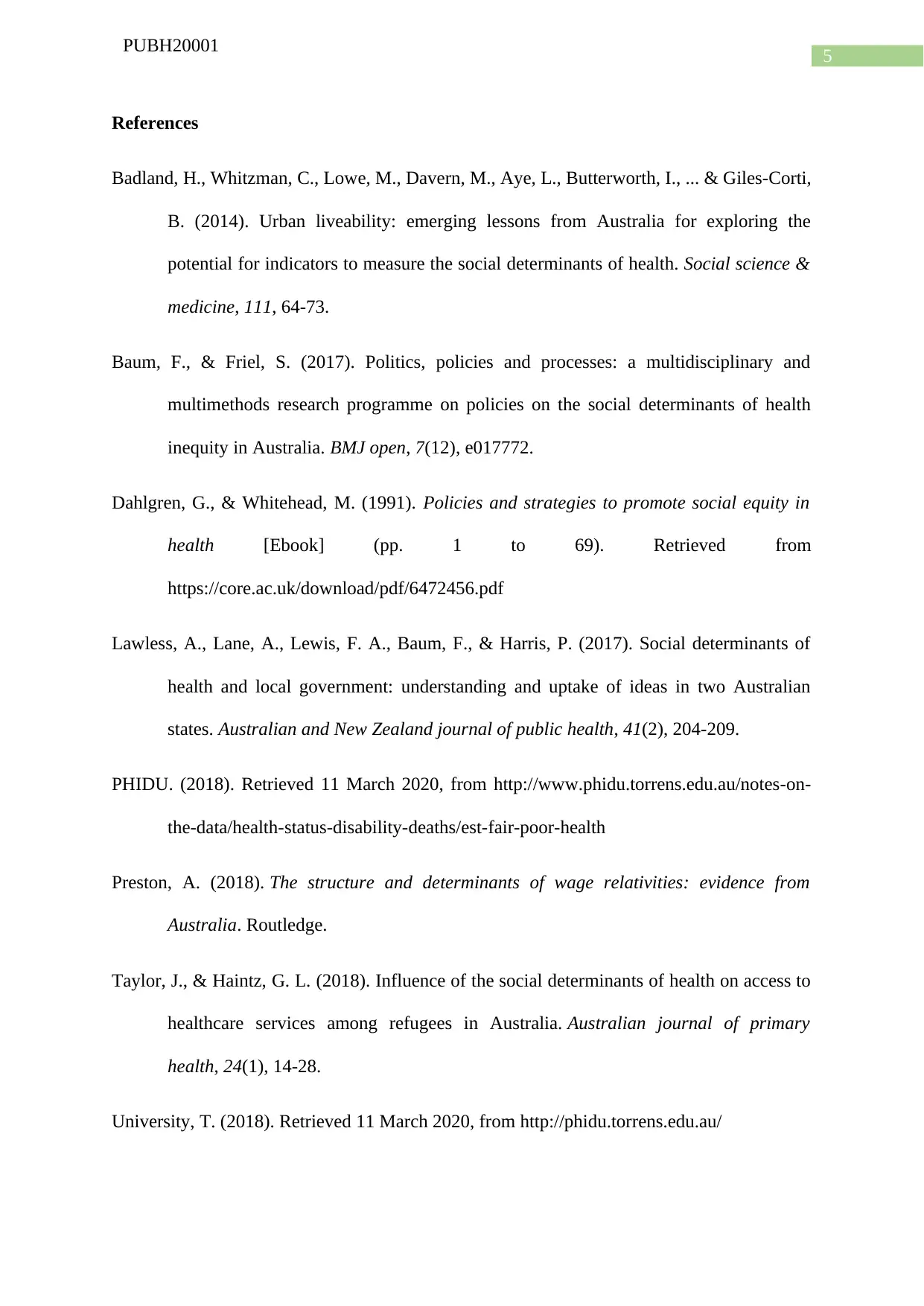
5
PUBH20001
References
Badland, H., Whitzman, C., Lowe, M., Davern, M., Aye, L., Butterworth, I., ... & Giles-Corti,
B. (2014). Urban liveability: emerging lessons from Australia for exploring the
potential for indicators to measure the social determinants of health. Social science &
medicine, 111, 64-73.
Baum, F., & Friel, S. (2017). Politics, policies and processes: a multidisciplinary and
multimethods research programme on policies on the social determinants of health
inequity in Australia. BMJ open, 7(12), e017772.
Dahlgren, G., & Whitehead, M. (1991). Policies and strategies to promote social equity in
health [Ebook] (pp. 1 to 69). Retrieved from
https://core.ac.uk/download/pdf/6472456.pdf
Lawless, A., Lane, A., Lewis, F. A., Baum, F., & Harris, P. (2017). Social determinants of
health and local government: understanding and uptake of ideas in two Australian
states. Australian and New Zealand journal of public health, 41(2), 204-209.
PHIDU. (2018). Retrieved 11 March 2020, from http://www.phidu.torrens.edu.au/notes-on-
the-data/health-status-disability-deaths/est-fair-poor-health
Preston, A. (2018). The structure and determinants of wage relativities: evidence from
Australia. Routledge.
Taylor, J., & Haintz, G. L. (2018). Influence of the social determinants of health on access to
healthcare services among refugees in Australia. Australian journal of primary
health, 24(1), 14-28.
University, T. (2018). Retrieved 11 March 2020, from http://phidu.torrens.edu.au/
PUBH20001
References
Badland, H., Whitzman, C., Lowe, M., Davern, M., Aye, L., Butterworth, I., ... & Giles-Corti,
B. (2014). Urban liveability: emerging lessons from Australia for exploring the
potential for indicators to measure the social determinants of health. Social science &
medicine, 111, 64-73.
Baum, F., & Friel, S. (2017). Politics, policies and processes: a multidisciplinary and
multimethods research programme on policies on the social determinants of health
inequity in Australia. BMJ open, 7(12), e017772.
Dahlgren, G., & Whitehead, M. (1991). Policies and strategies to promote social equity in
health [Ebook] (pp. 1 to 69). Retrieved from
https://core.ac.uk/download/pdf/6472456.pdf
Lawless, A., Lane, A., Lewis, F. A., Baum, F., & Harris, P. (2017). Social determinants of
health and local government: understanding and uptake of ideas in two Australian
states. Australian and New Zealand journal of public health, 41(2), 204-209.
PHIDU. (2018). Retrieved 11 March 2020, from http://www.phidu.torrens.edu.au/notes-on-
the-data/health-status-disability-deaths/est-fair-poor-health
Preston, A. (2018). The structure and determinants of wage relativities: evidence from
Australia. Routledge.
Taylor, J., & Haintz, G. L. (2018). Influence of the social determinants of health on access to
healthcare services among refugees in Australia. Australian journal of primary
health, 24(1), 14-28.
University, T. (2018). Retrieved 11 March 2020, from http://phidu.torrens.edu.au/
⊘ This is a preview!⊘
Do you want full access?
Subscribe today to unlock all pages.

Trusted by 1+ million students worldwide
1 out of 6
Related Documents
Your All-in-One AI-Powered Toolkit for Academic Success.
+13062052269
info@desklib.com
Available 24*7 on WhatsApp / Email
![[object Object]](/_next/static/media/star-bottom.7253800d.svg)
Unlock your academic potential
Copyright © 2020–2026 A2Z Services. All Rights Reserved. Developed and managed by ZUCOL.





